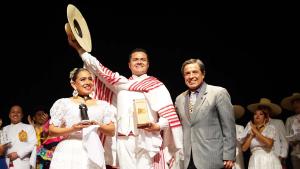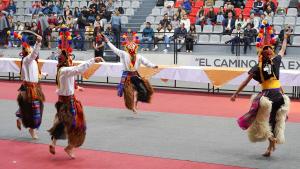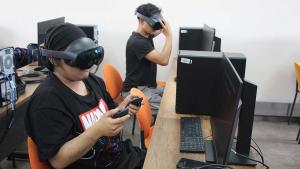Noticia
The UNESCO chairs programs at UPS donated electronic devices to the Cerebral Palsy Institute in Azuay
The UNESCO chairs program on support technologies for educational inclusion (Cátedra UNESCO Tecnologías de apoyo para la Inclusión Educativa) at UPS gave the Cerebral Palsy Institute of Azuay (IPCA for its acronym in Spanish) two devices: a robot to support education for children with disabilities and a multimedia box for visual, hearing and motor stimulation for children with disabilities.
These two devices are the result of research carried out by the Artificial Intelligence Research Group (Grupo de Investigación en Inteligencia Artificial (GIIATa)) and the computer engineering undergraduate program in UPS's branch campus in Cuenca.
The robot for children with disabilities: this device was built thanks to the donation from Peter Locher, a Swiss a person with intellectual and physical disabilities, and the work of the Inclutech company. Anita Parra, UPS student that collaborates with the UNESCO Chair Support Technologies for Educational Inclusion, explained that the robot performs basic actions, different facial expressions with arm movements, generating stimuli for the people who use it.
The robot was presented by Christian Stürzinger, the legal tutor of Peter Locher, who spoke about how they want this robot to benefit people with cerebral palsy.
The multimedia box for visual, auditory and motor stimulation of children with disabilities: it was built by students of computer Engineering, its design is based on the Andean Antelope Bear (Ucumari) and provides a series of educational and rehabilitation exercises.
The multimedia box was presented by Paola Ingavélez, a researcher of the computer engineering program, member of the UNESCO Chair and the GIIATa. Cristian Arévalo, creator of this device, explained how this can be used for the application of a series of therapies, the screening of educational videos and evaluations. The device can work through an external remote control and / or a mobile application.
Dr. Hernan Tenorio, director of the Cerebral Palsy Institute of Azuay, thanked the university, UNESCO and students for their permanent support to the institute. He said all the equipment is of great help for the people at the IPCA.
Contenidos Relacionados
Contenidos Relacionados
Noticias Relacionadas
Noticias Relacionadas





Follow us
Follow us